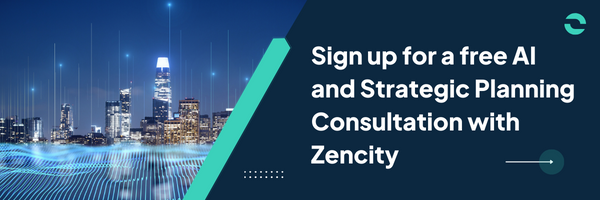Key Insights From Strategic Planning in the Age of AI
Lee Feldman
ICMA-CM (ret.)
Embracing AI in State and Local Government Strategic Planning
The integration of Artificial Intelligence (AI) into state and local government marks a significant shift in the landscape of strategic planning and public administration. The role of AI in these sectors is becoming increasingly essential, not only as a tool for innovation but as a cornerstone in enhancing community engagement, improving decision-making processes, and fostering trust among citizens.
Transforming Strategic Planning with AI
The incorporation of AI into strategic planning processes spells a leap toward enhanced efficiency and effectiveness. AI's capability to analyze vast datasets is pivotal in revealing crucial trends and insights. Predictive modeling, another facet of AI, plays a crucial role in forecasting future scenarios, empowering the creation of flexible and resilient plans. AI also significantly boosts stakeholder engagement by ensuring that community needs and opinions are integral to the planning process. Moreover, AI is instrumental in optimizing resource allocation for maximum impact and facilitates continuous improvement through ongoing analysis and feedback. This adaptability allows for dynamic adjustments in strategies, making the strategic planning process more robust, responsive, and forward-thinking.
Case Study: Bullhead City, Arizona
In Bullhead City, Arizona, AI has been instrumental in transforming the city's approach to strategic planning. After identifying a vacant 27,000-square-foot newspaper office as a potential site, the city collaborated with the city mayor and council, concluding it would be an ideal location for a new animal shelter. This decision was further supported by a series of strategic steps, including a council workshop, stakeholder focus groups, and a comprehensive community survey. The city utilized AI to analyze community feedback across various platforms, ensuring that residents' voices were heard and considered in decision-making. This approach allowed the city to tailor its services more effectively to meet the needs and preferences of its citizens.
Case Study, Nantucket, Massachusetts
Nantucket, Massachusetts, offers another compelling case of AI's role in local government. The island used AI technologies for predictive modeling, helping to anticipate future trends and challenges. This foresight has been critical in planning and allocating resources more efficiently, ensuring that the city remains proactive in its approach to governance and community services.
The Nantucket Transportation Plan, tailored to the unique challenges of the island, involved extensive community engagement through Zencity project pages, surveys, and multilingual social media campaigns. Garnering high response rates and recognition from MassDOT, the plan's success highlights a data-rich approach to understanding transportation needs, yet also reveals a significant need for AI to efficiently analyze the overwhelming volume of data collected.
Steps for Successful AI Implementation in Strategic Planning
To successfully incorporate AI in the strategic planning process, governments can undertake several key steps:
- Data Collection: Using AI to gather and analyze data from diverse sources such as social media, public forums, and city records can provide a comprehensive understanding of community needs.
- Public Engagement: Implementing AI-driven platforms for real-time citizen feedback and engagement can enhance the responsiveness and inclusivity of government decisions.
- Predictive Analysis: Employing AI for predictive modeling can help in anticipating future needs and trends, thus facilitating proactive planning.
- Resource Allocation: Utilizing AI to optimize budgeting and resource distribution based on data-driven insights can lead to more effective and efficient government services.
- Performance Monitoring: Applying AI tools to continuously monitor and evaluate the effectiveness of government programs and initiatives can ensure ongoing improvement and adaptation.
Summary
In conclusion, AI's impact on state and local governments is transformative, providing powerful tools for strategic planning and community engagement. The experiences of Bullhead City and Nantucket demonstrate the practical benefits of AI in enhancing government efficiency and responsiveness to citizen needs. By embracing these AI applications, governments can make more informed decisions, engage better with citizens, and proactively address the evolving needs of their communities.
%20copy-1.png?width=544&height=120&name=Logo_black%20(1)%20copy-1.png)





